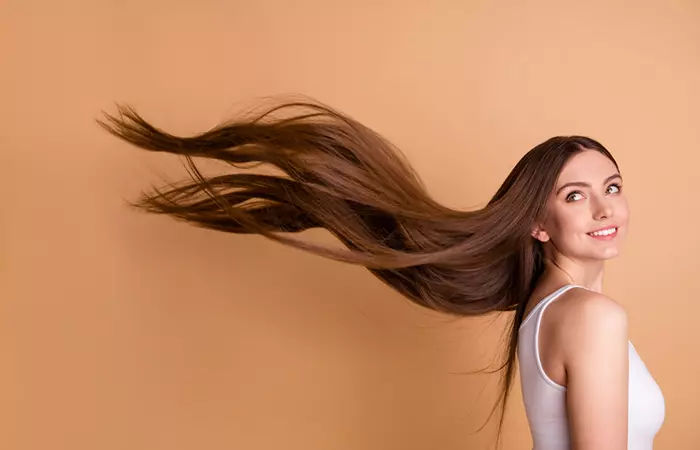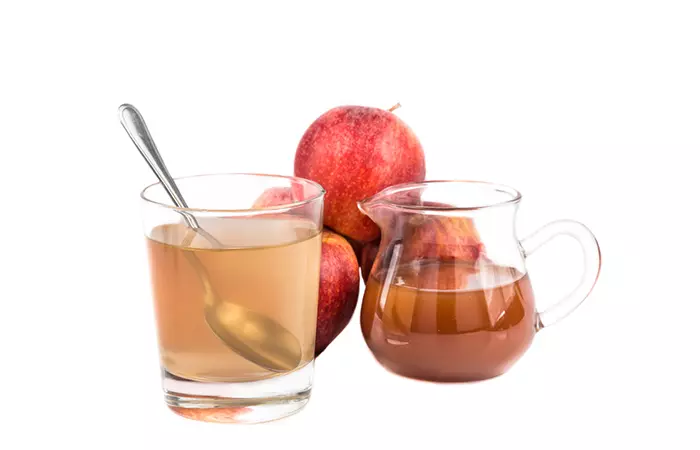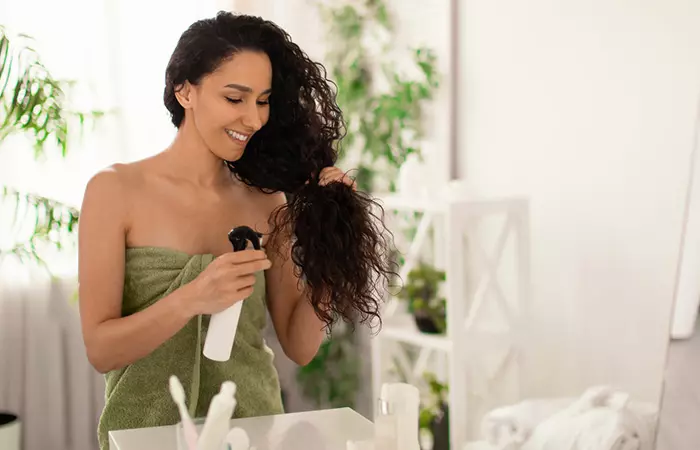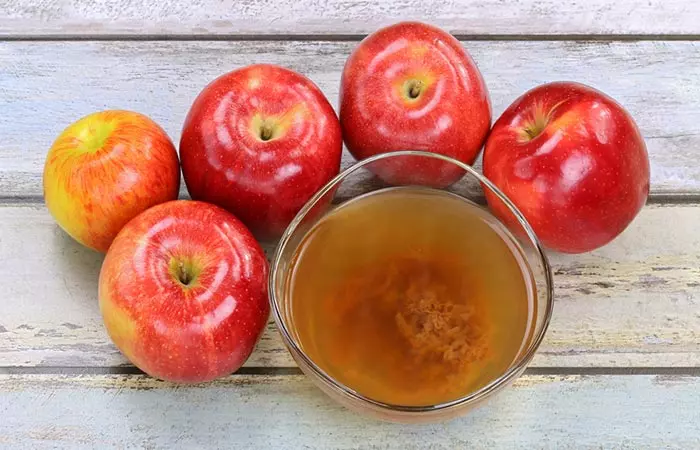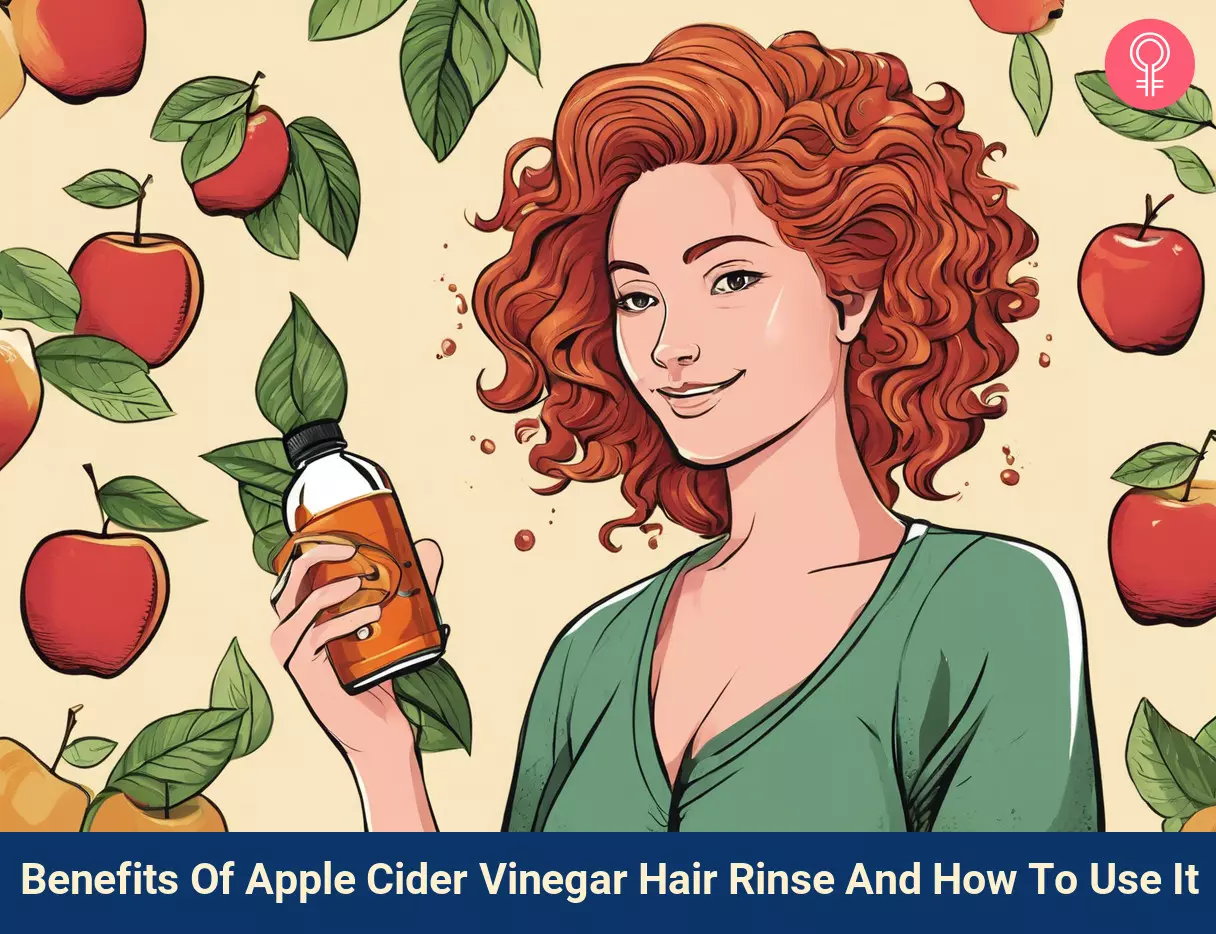Apple cider vinegar (ACV) has been used as a remedy due slightly acidic pH that prevents cuticles from opening, allowing them to retain their natural texture and sheen. Find out the benefits of ACV hair rinses and how they work in this article. Scroll down.
Antimicrobial Activity Of ACV Against Various Bacteria
Sarah Marie, a lifestyle blogger, talks about the benefits of using an apple cider vinegar rinse on her hair during her no-poo journey. She writes, “I don’t use conditioner either- and let me tell you what, my hair is actually stronger, shinier, and less dry & brittle thanks to apple cider vinegar and raw (unrefined) coconut oil (i).” Further, she adds a tip to detangle before washing your hair and using an ACV rinse as it makes the wet hair feel rough, however, it gets all smooth and soft, once dried. There are several ways of using ACV on the hair and skin. However, using it as a hair rinse gives quick and visible results. Moreover, there are various other natural homemade hair rinse that you can try to give your hair the necessary boost of health. Scroll down to learn how to whip up a quick, safe, and natural homemade hair rinse with ACV:
How To Make An ACV Hair Rinse
Always use a fresh rinse and prepare it just before taking a shower. You don’t need to condition your hair as ACV is a natural conditioner. Here’s how to make it: You Will Need
2-4 tablespoons of apple cider vinegar 1 cup (8 oz.) of water A spray bottle
Preparation Use the ACV hair rinse depending on the hair and scalp condition. For oily hair, use it once every week, while for dry hair, use it once or twice a month. For normal hair type, use it once every two weeks. Here you can use apple cider vinegar for your hair as a rinse.
How To Use ACV Hair Rinse
As A Pre-shampoo Treatment As A Natural Conditioner (Post-Wash Rinse) You can also add natural and herbal extracts, juices, and ingredients to enrich your ACV hair rinse. Check out the recipes below.
Some More ACV Hair Rinse Recipes
1. ACV And Aloe Vera Hair Rinse
This hair rinse recipe is great for dry hair. Aloe vera gel has hydrating properties and acts as an emollienti A waxy substance that helps soften and hydrate the skin by creating a thin film over it and retaining moisture. for dry skin (3). It may help restore dry and flaky scalp and keep the hair healthy. You dont need to condition your hair after using this hair rinse. You Will Need
4 tablespoons of apple cider vinegar 1 tablespoon of aloe vera gel A squeeze bottle A mixing bowl
Method
2. ACV And Essential Oil Hair Rinse
This one is for all aromatherapy lovers. Lavender, peppermint, and rosemary essential oils have shown hair growth-promoting effects in animal studies (4), (5), (6). This hair rinse is best for those who have hair fall issues. You Will Need
¾ cup filtered or purified water ¼ cup of apple cider vinegar 3 drops of rosemary oil 3 drops of lavender oil 3 drops of peppermint oil A clean spray bottle (200 ml capacity)
Method
3. Horsetail, Nettle, And ACV Hair Rinse
This hair rinse is best for those with alopeciai A disease that causes hair loss from the scalp and the body when the immune system attacks hair follicles. and telogen effluvium. When taken as food, horsetail extract may strengthen and thicken your hair by inhibiting the baldness-causing genes and respective proteins (7). Animal studies found that applying nettle extract could promote blood circulation and cell growth and induce anagen (growth) in hair follicles (8). You Will Need
¼ cup of dried horsetail ¼ cup of dried nettle 2-3 drops of lavender essential oil or ¼ cup of dried lavender 4 cups of apple cider vinegar A 1-quart mason jar A 1-quart glass or spray bottle
Method These three unique ACV hair rinse recipes will make you fall in love with your hair. Try them to get back the natural shine and texture of your locks. And while you are at it, keep these points in mind.
Tips To Remember When Using An ACV Hair Rinse
Adjust the quantity and dilution rate of ACV as per your hair length, scalp type, and dermatological concerns. Do not use an ACV hair rinse on color-treated hair and sensitive scalp. ACV can fade the color, and the acetic acid in it can irritate a sensitive scalp. Avoid getting ACV into your eyes. Do not overuse this rinse. Use it every two weeks initially and see how your hair and scalp respond.
Leah, a skin care, hair care, and lifestyle blogger offers an insight in her blog on you feeling like she has overused ACV. “When I went through a period of dry hair I stopped using apple cider vinegar on my hair for a few weeks and noticed a difference (ii),” she notes.
Use top-quality ACV with ’vinegar mother’ or 100% pure’ tags. Adulterated and processed ACV may irritate your hair and skin.
Washing your hair with apple cider vinegar (ACV) usually does not cause adverse effects. However, using it wrong may cause some symptoms. Learn more about them in the next section.
Side Effects Of Washing Your Hair With Apple Cider Vinegar
Its acidic nature may cause scalp irritation, dryness, or itching, or even damage hair cuticles if used in higher concentrations or without diluting properly. Overuse can also lead to hair dryness and breakage, especially if you have dry or brittle hair. ACV’s strong smell may persist even after rinsing and may cause temporary unpleasant odor.
You can minimize these potential risks by properly diluting ACV with water before use and conducting patch tests. Limit its use to once or twice a week. Also, consult a dermatologist or hair care professional if you experience persistent side effects. Do you need baking soda for ACV rinse? Check out the infographic below to learn how you can benefit from apple cider vinegar in your daily life.Illustration: StyleCraze Design Team Baking soda is generally added to an ACV rinse to balance the pH level of the scalp. It can also be skipped if it does not suit your hair. What does apple cider vinegar do to gray hair? Apple cider vinegar can be used to manage the frizz and dryness of gray hair. It also helps remove toxins and product buildup from the hair and scalp. Will apple cider vinegar stop itchy scalp? Yes, apple cider vinegar can help manage an itchy scalp. It has antibacterial and antifungal properties that help reduce the itchiness of the scalp. Use apple cider vinegar diluted with warm water as a hair rinse to manage an itchy scalp.
Illustration: Benefits Of Apple Cider Vinegar Hair Rinse And How To Use It
Revolutionize your hair care routine and embark on a transformative 30-day challenge to explore the wonders of apple cider vinegar hair rinse for luscious locks and a healthy scalp. Watch this video now!
